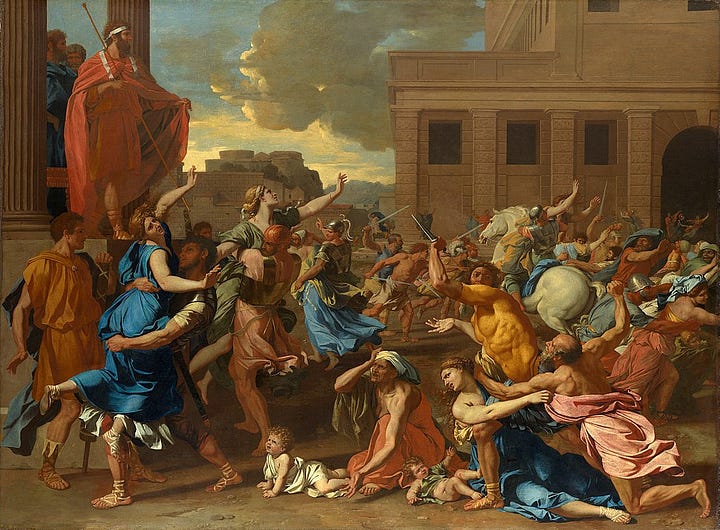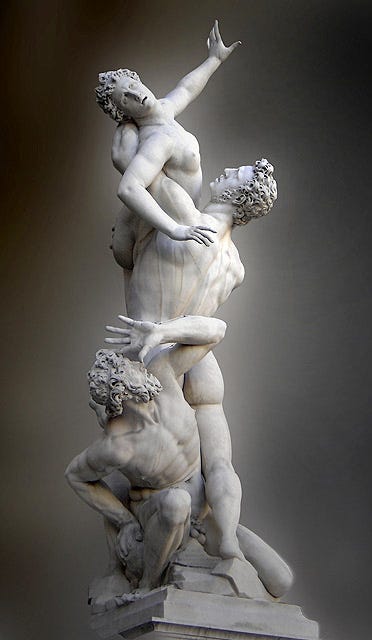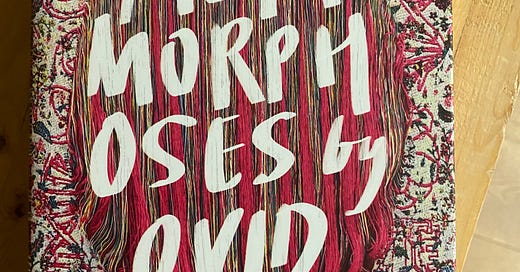Unweaving Philomela's Tapestry
What a startling new translation of Ovid's Metamorphoses has to say about the book wars
1.
What gets a book banned from schools and public libraries in 2023?
At last month’s committee hearing on HB900 in the Texas House of Representatives, Rep. Jared Patterson, the author of the bill, swore that the only answer is sexually explicit content. “I want to be very clear,” he said. “This is not a fight about silencing minority voices. And this is not an argument about race or gender or religion or political ideology. There is one common denominator in the books that we are addressing with this bill: and that is sexually explicit content.”
When you look at the totality of books that have—and haven’t—been challenged across Texas in this most recent push for censorship, Representative Patterson’s answer becomes less and less convincing. Not far from Patterson’s home district of Frisco, in Keller ISD, the school board has banned from the district any book that mentions what they call “gender fluidity,” whether it has sexual content or not. That same impulse has led to outrage about Red: A Crayon’s Story in Victoria, Texas and Jacob’s New Dress in Tomball. At the same time, there are countless books with sexual content—including explicit sexual content—that haven’t been challenged, at least not in this recent censorship wave. Ulysses is sitting unmolested on the shelves of Frisco High School. So is a Marc Chagall-illustrated edition of the e.e. cummings poem “May I feel said he,” described in the library catalog as a “sensually ecstatic tribute to love.”
One common rejoinder is that what really bothers the book banners is not sex per se, but books by and about people with marginalized identities—especially books that center the experiences of people of color or members of the LGBTQ community. The sexual content, in other words, is an excuse to get those books removed. And analyses of book challenges do bear out the fact that such books are disproportionately targeted for removal.
I think those analyses are revealing. At the same time, I think the conversation around the targeting of books from and about marginalized identities is missing a step, and that missed step leaves out important nuance and leaves anti-censorship arguments vulnerable to counterexamples. I’ve watched and read a lot of Patterson’s comments on books over the past year and, it’s true: he gets worked up about All Boys Aren’t Blue. But he also spits venom when he talks about The Perks of Being a Wallflower and Elana K. Arnold’s Damsel. Patterson himself appealed The Glass Castle all the way to the school board in Frisco. None of those last three books center queer characters or people of color.
But they—along with All Boys Aren’t Blue and The Bluest Eye—do have something else in common: sexual violence. And, to be more precise, they all deal with sexual trauma either from the perspective of the victim or in a way that’s sympathetic to the victim.
That last sentence is important, because rape and sexual assault have been themes in Western art and literature from its beginnings. I mean that literally—the Rape of the Sabine Women is one of the founding myths of Roman civilization, and has been the subject of some of history’s most celebrated works of art and literature.


That theme continues well into the twentieth century: consider first sexual encounter between Howard Roark and Dominique Francon in The Fountainhead, by Ayn Rand, an author who argued that “the ideal romance had to start with violent antagonism” and who described that particular scene as “the most romantic encounter possible in my kind of style.”
Rand’s treatment of sexual violence might be less graphic (or, to frame it differently, more romanticized) than Steven Chbosky’s in Perks of Being a Wallflower, but her moral message is a thousand times worse. If you ask me which book I’d rather young people read to learn about relationships between men and women, it’s an easy choice. But Patterson has gone to war against Chbosky, while leaving The Fountainhead alone.
2.
I’ve been thinking about all of this lately because I’ve been reading through Stephanie McCarter’s startling new translation of Ovid’s Metamorphoses, the “elegy-informed epic” that formed much of the foundation of our understanding of classical mythology.
“Around fifty of the epic’s tales involve rape or attempted rape,” McCarter writes in her introduction. And—unlike many previous versions of the work, McCarter’s translation doesn’t obscure that reality.
Keep reading with a 7-day free trial
Subscribe to Anger & Clarity to keep reading this post and get 7 days of free access to the full post archives.







